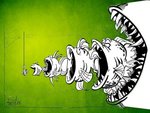babyjake1961
Well-known member
- Messages
- 392
- Likes
- 13
I even got banned on another forum for asking this question. People who would normally tolerate a wide range of really diverse opinions suddenly went nuts and started throwing insults at me for simply asking. Was just so odd to see such a sudden extreme reaction to a seemingly routine question.

